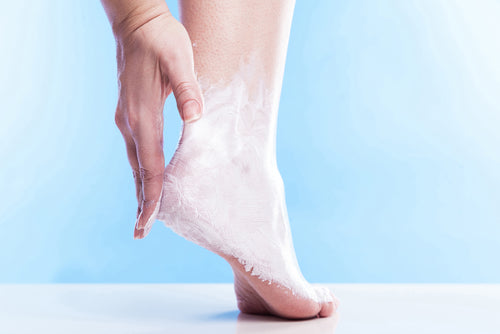How to Keep Your Skin Healthy During the Winter: The Ultimate Guide for People with Diabetes
Both diabetes and the cold winter months can be tough on your skin, and the two combined only increase the likelihood of dryness, flaking, cracking and other problems. If you’re a diabetic looking to keep your skin healthy and whole this winter, you’ve come to the right place. Follow these seven tips to keep your skin protected no matter how cold and snowy it gets outside.

1. Cover Your Hands and Feet
Jackets and pants will protect your core from the elements, so don’t forget your extremities. If you’re going to be out in the cold, wear gloves with grips so you can stay warm and grasp objects without having to remove your gloves. Wear thick socks that will absorb sweat instead of letting it sit on your skin; wool blends are particularly good at wicking away moisture.
Wearing house shoes or even regular shoes over your socks while indoors will keep you from sliding on the floors and accidentally hurting your feet. Make sure to keep following your diabetic foot care routine as the seasons change.
2. Choose the Right Shoes
Speaking of protecting your feet, you’ll want to carefully choose your winter shoes. Look for a pair that will give you the support you need for long shopping trips as well as a water-resistant exterior that will fend off the elements. If you get a lot of inclement weather in your area, you’ll also want a thick yet flexible rubber sole with plenty of grips on the bottom to give you traction in rain and snow. If you decide to go shoe shopping, try them on at the end of the day when your feet are the most swollen, to ensure they have enough room to accommodate your feet.

3. Protect Your Face
You need to protect your face as well as your hands and feet. That starts with a daily moisturizer that contains SPF protection. Yes, you can still get sunburned in winter; in fact, if it snows, it will reflect the sunlight and make it more likely that you get burned. Use lip balm regularly to keep your lips moisturized. If you’re out in the elements, consider wrapping your face in a scarf or otherwise covering it to protect yourself from snow and sleet.
4. Stay Hydrated
You want to stay hydrated from the outside in as well as the inside out. While holiday beverages aren’t exactly known for their hydrating properties, you can counterbalance them by drinking plenty of water and unsweetened, non-caffeinated beverages. If it’s hard to motivate yourself to drink plain water, hot decaf tea is an excellent alternative for the winter months, keeping you warm and hydrated at the same time.
5. Avoid Scalding Hot Showers
Nothing feels better than jumping into a hot shower after a long cold day, right? While you may be tempted to turn the temperature all the way up, diabetics have to be careful not to accidentally scald themselves since diabetes can compromise nerve endings and people’s ability to sense temperature changes.
Hot temperatures also dry your skin out faster, which can hasten cracking and peeling. Warm showers and baths are fine, but keep the temperature moderate so you don’t burn yourself or dry out your skin too much. You can always test the water temperature with your elbow before hopping in if you’re unsure.

6. Moisturize, Moisturize, Moisturize
Whether or not you’re diabetic, the harsh winter weather will dry out your skin, making it more prone to flaking, cracking and other skin conditions that can develop into greater problems. In addition to applying your daily facial lotion, you should also moisturize your entire body after getting out of the shower or bath with diabetic lotion. While this routine may take some time, it will make a serious improvement in your skin’s dryness if you can keep it up regularly.
7. Manage Your Blood Sugar
Having out-of-control blood sugar will make any skin conditions you do develop slower to heal. With unchecked diabetes, a small crack in your skin can grow and get infected rather than repairing itself. While holiday foods may tempt you to eat unhealthily, try to indulge in moderation and keep track of your blood sugar so it doesn’t spike or drop too far.
Winter does make it more difficult to keep your skin healthy and moisturized, but it’s not impossible. If you have diabetes, follow these seven tips to leave your skin glowing this winter.
Kaki Zell - Vice President of Sales, Marketing, eCommerce at Legs-4-Life LLC Kaki holds a Bachelor of Science degree in Business Administration and Management from Virginia Polytechnic Institute and State University. She’s been working in the medical device industry for over 11 years and currently serves on the Board of Directors for the Greensboro Science Center.